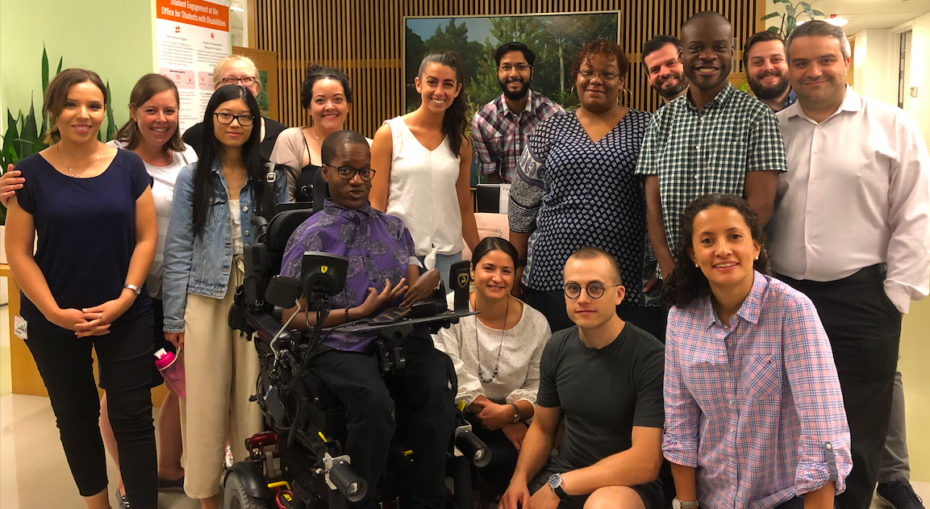
How is McGill improving its accessibility and inclusivity on campus? What areas need shoring up? And how can all members of the McGill community help foster the culture of accessibility at the University?
The Office for Students with Disabilities (OSD) is mandated to facilitate and support the inclusion of diverse learners. “Our goal is really to champion the notion of accessibility and inclusivity at our University,” the OSD team said in the following interview.
Could you describe the mission and work of OSD?
OSD: Our primary mandate is to ensure the inclusion of students with disabilities, enabling them to engage in the entirety of the McGill experience. We are working with the University to reach the legally mandated provision of accessible materials and of academic supports.
More and more, we have been collaborating with other offices on projects that promote inclusivity, partnering with the McGill entities that oversee the physical accessibility of buildings on campus, and working with the different faculties to ensure that the delivery of course content is accessible.
Our goal is really to champion the notion of accessibility and inclusivity at our University.
What are some of the ways that McGill is currently improving its accessibility and inclusivity?
OSD: From our perspective, the most success has been reached through a collaborative network that is made up of various relationships. Indeed, many of the important steps taken to advance accessibility and inclusivity are happening through the inter-office partnerships that have formed over time, may that be formally (i.e. through a specific project) or informally (i.e. through relationships).
Some examples would be the Interactive Accessibility Map, which is seed-funded by the SPF and overseen by OSD, which is partnering with Campus Planning & Development Office and the GIC.
We are also really encouraged to see the advances in the ways staff and faculty are getting access to support (notably through Office of the Provost and Vice Principal). Design Services has recently released its new accessibility standards for buildings on campus. And the Office of Sustainability has been working with us to thread accessibility into sustainability, notably through the upcoming consultations for the next Climate and Sustainability Strategy. The idea here is to ensure that accessibility is not an isolated section, but is rather included throughout the consultations.
Such initiatives have enabled the embedding of the notion of accessibility and inclusivity in a variety of mandates. Accessibility is becoming less of a single responsibility and becoming a shared one.
What are areas that still need our efforts and/or what is the most urgent need (may that be financial or social)?
OSD: We wouldn’t call this a need per say, but rather something to keep on our radar: When looking at the number of students registering with us through the years, we notice that this number keeps increasing and the complexity of needs is expanding.
More students are needing supplemental academic support, such as help with note-taking skills and support relating to their learning styles. Though these are not always linked to a disability, we are finding that most students are struggling and require additional help.
We need to be ahead of the game and keep our definition of disability open. Accessibility is not just about people with a legal document. It’s about accessibility in general, which should also consider students coming from different countries or who are having a harder time adapting to life at university.
How can we, as staff and students, foster the culture of accessibility at McGill?
OSD: A big part of inclusion is being aware. Know that there are invisible disabilities. If you see someone in need of extra support, be an advocate for them.
For the accessibility of events, remember to provide information about the venue and the event in advance. This allows people to know what they can expect. By informing individuals, you are empowering them. If you are participating in an event, keep in mind that you can always ask event organizers if they have thought about the accessibility and inclusivity of their event. If you would like to learn more, we offer sessions discussing the accessibility of events through Skills 21 and Organization Development.
Another opportunity to get involved is through the Interactive Accessibility Map, which will be integrated in the overarching map of the university. You can provide feedback on the map once it is published and as it evolves through time, or join the Open Mapping Group (OMG) to participate in the design of the map.
This article was prepared by the McGill Office of Sustainability as part of its Sustainability Monthly Challenges. These challenges tap into each facet of sustainability – namely environmental, social and economic – in the hopes to target both the University’s operations and our everyday behaviours. Find out more.
